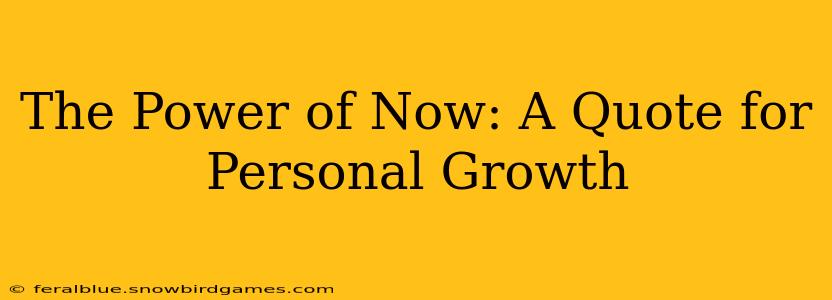Eckhart Tolle's "The Power of Now" isn't just a book; it's a philosophy, a practice, and a potent catalyst for personal growth. Its core message, often distilled into the simple phrase "be present," holds profound implications for navigating life's challenges and unlocking our full potential. This exploration delves into the power of this concept, examining its impact on our mental well-being, relationships, and overall life satisfaction. We’ll also address some common questions surrounding this impactful idea.
What Does "Be Present" Actually Mean?
This seemingly simple phrase, "be present," is deceptively complex. It's not merely about physical presence in a given moment. It's about cultivating a mindful awareness of your thoughts, feelings, and sensations without judgment. It's about letting go of the mental chatter – the constant stream of worries about the future and regrets about the past – that prevents us from fully experiencing the present moment. Being present is about fully engaging with your current experience, whether it's the taste of your coffee, the feeling of the sun on your skin, or a heartfelt conversation with a loved one.
How Can Being Present Improve My Mental Well-being?
The benefits of presence are numerous and deeply impactful on mental health. When we're constantly caught in the anxieties of tomorrow or the ruminations of yesterday, we create a cycle of stress and negativity. Being present anchors us in the now, allowing us to detach from these anxieties. This practice helps to:
- Reduce stress and anxiety: By focusing on the present, you lessen the grip of future worries and past regrets.
- Increase self-awareness: Presence allows you to observe your thoughts and emotions without judgment, leading to greater self-understanding.
- Improve emotional regulation: By being present with your emotions, you learn to manage them more effectively.
- Boost self-compassion: Present moment awareness fosters kindness and acceptance towards yourself.
Does Being Present Improve Relationships?
Absolutely. When we're present with others, we truly listen and engage with them, fostering deeper connection and understanding. It’s easy to get caught up in our own thoughts and feelings during interactions, but conscious presence allows us to fully engage with our partners, friends, and family, creating richer, more meaningful relationships. This involves:
- Active listening: Paying attention not only to what someone is saying but also to their body language and emotions.
- Empathy: Stepping into another person's shoes and understanding their perspective.
- Authentic connection: Being genuine and present in your interactions, fostering a sense of trust and intimacy.
How Do I Practice Being Present?
Cultivating presence is a skill that develops with consistent practice. Here are a few techniques:
- Mindfulness meditation: Regular meditation helps train your mind to focus on the present moment.
- Deep breathing exercises: Focusing on your breath is a simple yet powerful way to anchor yourself in the present.
- Body scan meditation: Bringing awareness to different parts of your body can help ground you in the present moment.
- Engaging your senses: Paying close attention to your senses – sight, sound, smell, taste, and touch – can help you become more present.
Is It Difficult to Stay Present All the Time?
No, and it's not the goal. The mind naturally wanders. The key is to gently redirect your attention back to the present when you notice your mind has drifted. It’s about cultivating a gentle awareness, not striving for perfect presence. Every time you gently bring yourself back, you strengthen your ability to be present.
What Are Some Common Obstacles to Being Present?
Common obstacles include:
- Overthinking: The constant stream of thoughts can pull you away from the present.
- Worrying about the future: Anxiety about the unknown can prevent you from appreciating the now.
- Regretting the past: Ruminating on past mistakes can keep you from fully experiencing the present.
- Distractions: Technology, social media, and other external stimuli can easily divert your attention.
Overcoming these obstacles requires consistent effort and self-compassion.
Conclusion
The Power of Now, as encapsulated in the simple act of "being present," is a transformative concept. By cultivating presence, we can significantly improve our mental well-being, enrich our relationships, and unlock our full potential. It's a journey, not a destination, and with consistent practice, the benefits of presence will profoundly impact your life.

